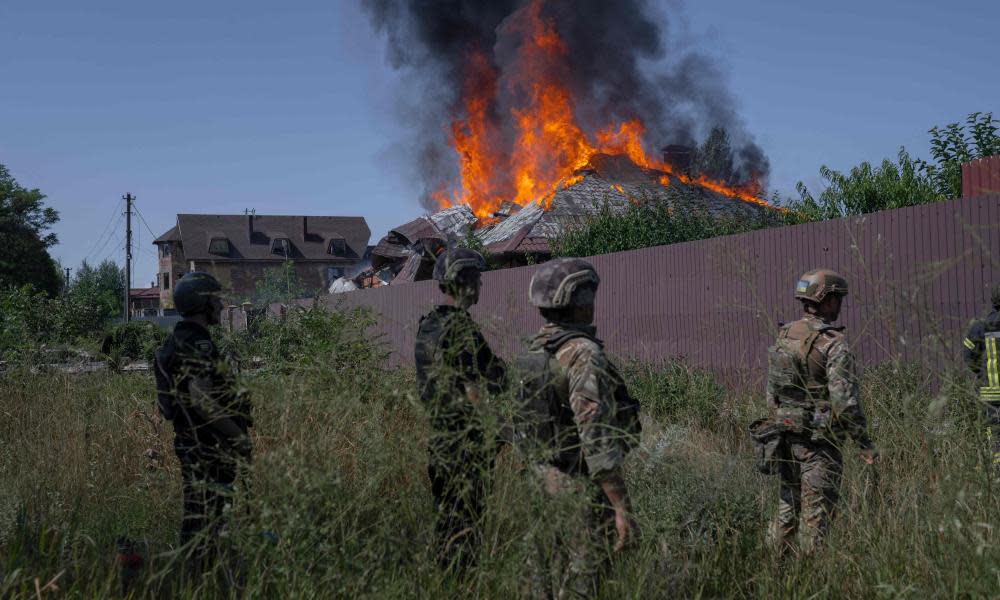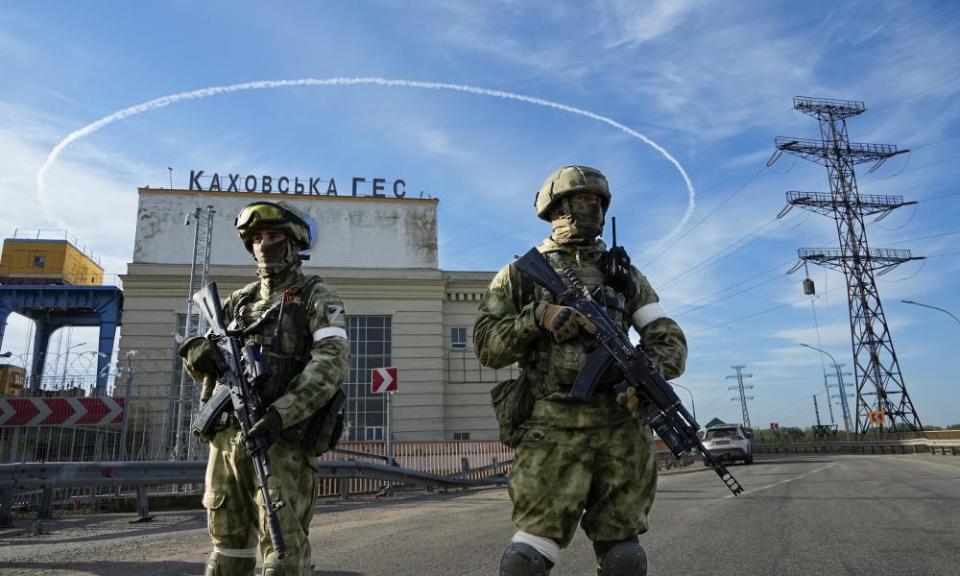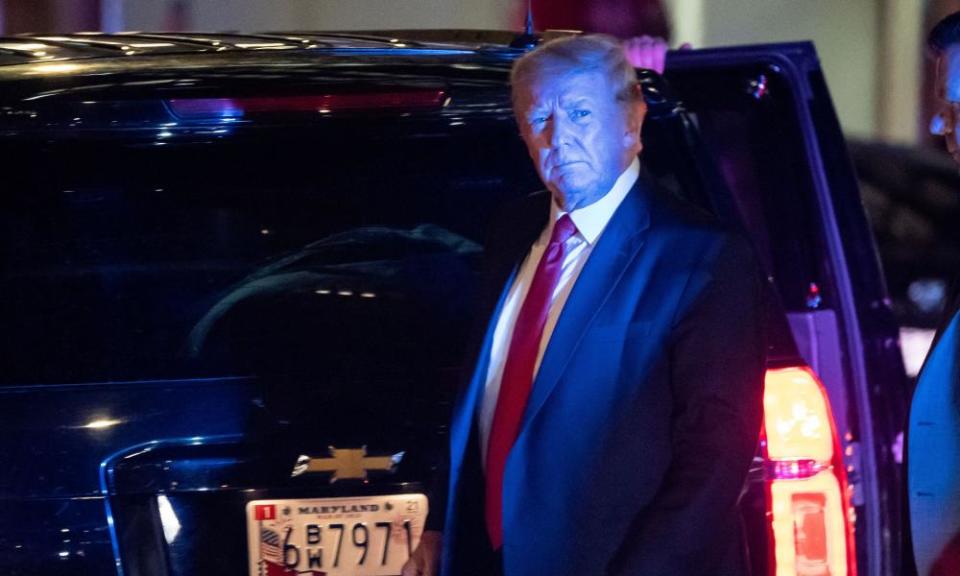Thursday briefing: The weeks that could decide fate of Ukraine conflict

Good morning. Europe’s largest nuclear plant was shelled over the weekend, and for days Ukraine and Russia have blamed each other. The plant was seized by Russia in March and used as a military base but is still run by Ukrainian staff. The incident has prompted significant concern from international organisations, scientists and neighbouring countries.
Beyond the obvious dangers of a nuclear plant being shelled, there is also anxiety that Russia is trying to connect the facility to the grid in Crimea. If this happens, it’ll be the first time that one country has stolen a nuclear reactor from another.
As the war moves into its sixth month, the end seems no closer. I spoke to Guardian foreign correspondent Luke Harding in Ukraine about the current situation and what to expect from the coming months. That’s right after the headlines.
Five big stories
US | Donald Trump has refused to testify in the New York attorney general’s investigation of the former president’s real estate dealings.
Wildfires | More than 6,000 people have been evacuated from the Gironde region of France after a wildfire, which began in July, reignited due to drought and high temperatures.
Energy | Research by the Energy and Climate Intelligence Unit has found that poorly insulated homes will have to pay almost £1,000 more than other homes on their energy bills this winter.
Politics | Former prime minister Gordon Brown has called for the government to scrap the energy price cap and renationalise energy companies that cannot offer lower rates.
Space | An image of the remnants of a supernova has been captured in stunning detail by a new Australian supercomputer called Setonix. The second installation is expected to be completed later this year.
In depth: ‘It’s going to be hard and it’s going to be bloody’

As Russian forces gather in the south of the country, it’s becoming clear that the war in Ukraine is entering a new, decisive phase. Russia wants to hold out for the winter, when most of Europe will be in the thick of an energy crisis and more likely to push for a negotiated agreement. President Zelenskiy has made it clear that Ukraine will not cede territory to Russia. So, what happens next?
***
What does Russia hope to achieve?
When Russia invaded Ukraine in February, the goal was clear: topple the government and replace it with a pro-Putin administration. When Kyiv didn’t fall, the strategy changed: take the Donbas. “This led to a grinding fight over the last three months that was being fought primarily with artillery, second world war style, where Russia has an advantage,” Luke says. That relentless onslaught led to the Russians gaining some territory – they now occupy all of Luhansk province.
“That’s still happening. But where I am in the south is in phase three of the war,” Luke says. There, Ukraine has launched its first major offensive in Kherson – a city that has been under Russian occupation since the start of the invasion. It’s of significant tactical importance as a transport hub and it has a key river crossing that would act as a natural barrier from attacks. “From a strategic point of view, it makes complete sense for Ukraine to take back the city,” says Luke. He adds that there are humanitarian reasons too: “By all accounts it is a place of murder, of kidnapping, of intimidation, of Bucha style horror.”
However, whether Ukraine will be successful remains an open question: “Talking to commanders here, they still haven’t really got enough heavy weapons. Russia has got enormous advantages in terms of firepower, ammunition, artillery shells, rocket launchers. So for Ukraine, it’s going to be quite hard and it’s going to be bloody.”
***
What are the chances of de-escalation?
The tactical agreement to allow grain exports via the Black Sea was seen as a tentative sign of cooperation – the UN chief, António Guterres, hailed the agreement as “a beacon of hope”. However it is also incredibly fragile. “You never want to predictive in this situation, because it’s very fluid, but it would surprise no one if Russia were to sink one of these grain ships, and claim Ukraine did it,” Luke says.
While the deal is essential for Ukraine’s economy, it is also beneficial for Russia – so it’s not simply an olive branch from the Kremlin. Their core plan still hasn’t changed, Luke explains. “The goal [for Russia] is still to exterminate Ukraine, its infrastructure, its education system and its culture.” With both sides clear that they will accept no less than full victory, de-escalation seems unlikely.
***
The west’s response
Earlier this week, the US president, Joe Biden, pledged to give Ukraine another billion dollars in rockets, ammunition and other equipment – its single largest military aid package yet. But Ukrainian commanders say they still need more to stand any chance of keeping Russian forces at bay: one commander has said that for every hundred shells that Russia fires at the city, Ukraine can respond with 10. However, Luke points out that US supplied Himars precision-guided artillery has partly equalised the situation because they’re being used to target Russian logistics centres, weapons depots, and command points, severing some supply lines which has in turn led to a decrease in Russian shelling.
But Ukraine’s reliance on western military aid could create further complications down the road. “Let’s say there’s a change of administration in the US or the Democrats get smooshed in November, the fear is the supply of weapons to Ukraine will decrease or stop,” Luke explains. “If the Americans stop supplying Ukraine with weapons, then you imagine that Ukraine would fall.”
– – –
Support our journalism in Ukraine
The truth, they say, is the first casualty of war. For more than six months, Guardian correspondents in Ukraine have delivered powerful, independent reporting. We have been doing this for 200 years, in times of crisis and peace. Please show your support today, from just £1.
What else we’ve been reading
Sirin Kale and David Blood’s interviews and data reveal the personal cost of the Airbnb economy to Britain’s communities, as residents become turfed out of their homes by demand for properties. Craille Maguire Gillies, production editor, newsletters
While fans eagerly await Succession’s return, Vanity Fair takes a peek behind the scenes of last season with the show’s Emmy-nominated directors. Hannah J Davies, deputy editor, newsletters
Hay fever, oppressive heat, anxiety about the climate emergency … Michael Cragg meets the “summer grinches” who can’t wait for winter, and offers a great read for when temperatures soar. Craille
Vulture’s new pop culture podcast Into It manages to be both incredibly informative and an easy listen. Its first two episodes cover the rise and rise of indie film distributor/producer A24, and Beyoncé’s gamechanging approach to album releases. Hannah
Alan Lodge’s 1992 photograph of illegal ravers basking in the morning sun at Castlemorton offers a burst of unadulterated joy. He gives the inside story and talks about being a sort of activist shooter, including documenting one of the biggest mass arrests in British legal history, at Stonehenge in 1985. Craille
Sport
Tennis | While fellow Brits Cameron Norrie and Dan Evans progressed, Andy Murray was beaten in the first round of the National Bank Open.
Football | Brentford’s €15m offer for Danish midfielder Mikkel Damsgaard has been accepted by Sampdoria. Damsgaard will sign for the Bees on a five-year contract.
Media | The BBC has refused to back down over its decision to scrap the classified football results on Radio 5 Live and said that continuing to broadcast the full service would “constrain the number of sports we could cover”.
The front pages
This morning’s Guardian print edition leads with “Take control of energy firms that will not cut bills, Brown tells PM”. The i says “Energy firms threatened with new windfall tax” while the Metro has “Energy bills hell – ‘It’s as bad as Covid crisis’” . The Times’ splash is “Police failing victims of burglary, says watchdog”. The Daily Mail says “At last, a police chief who gets it”. The Express reports on one angle of the supply chain crisis with “Fears patients’ lives at risk in medicine shortage”. The Mirror continues to cover the Giggs trial, headlining on testimony that his “ex felt ‘like a slave’”. The top-story headline in today’s Financial Times becomes a tongue twister towards the end: “Slight easing in US inflation spurs hope pace of prices rises has peaked”.
Today in Focus

The FBI raid of Donald Trump’s home
Congressional reporter Hugo Lowell explains why the FBI raided Trump’s Mar-a-Lago resort on Monday morning, and how it may even benefit the former president in the long run
Cartoon of the day
Raymond Briggs died yesterday at the age of 88. Click here for more of his beautiful illustrations.
The Upside
A bit of good news to remind you that the world’s not all bad
In the 1800s, rabbits, cats, rats and mice were introduced to Macquarie Island, a world heritage site in the Southern Ocean, and the critters promptly multiplied, causing havoc. At one point there were as many as 300,000 rabbits on the island.
Since 2014 the island has been pest-free after what might considered a brutal but necessary eradication scheme. The result: birds such as blue and grey petrels, which had been hunted off the island by cats, were returning, and the numbers of Antarctic prions and white-headed petrels, which nest in burrows, began increasing. “This one action, the eradication, has saved entire communities and species,” says conservationist Dr Justine Shaw.
Sign up here for a weekly roundup of The Upside, sent to you every Sunday
Bored at work?
And finally, the Guardian’s crosswords to keep you entertained throughout the day – with plenty more on the Guardian’s Puzzles app for iOS and Android. Until tomorrow.

 Yahoo Movies
Yahoo Movies 
